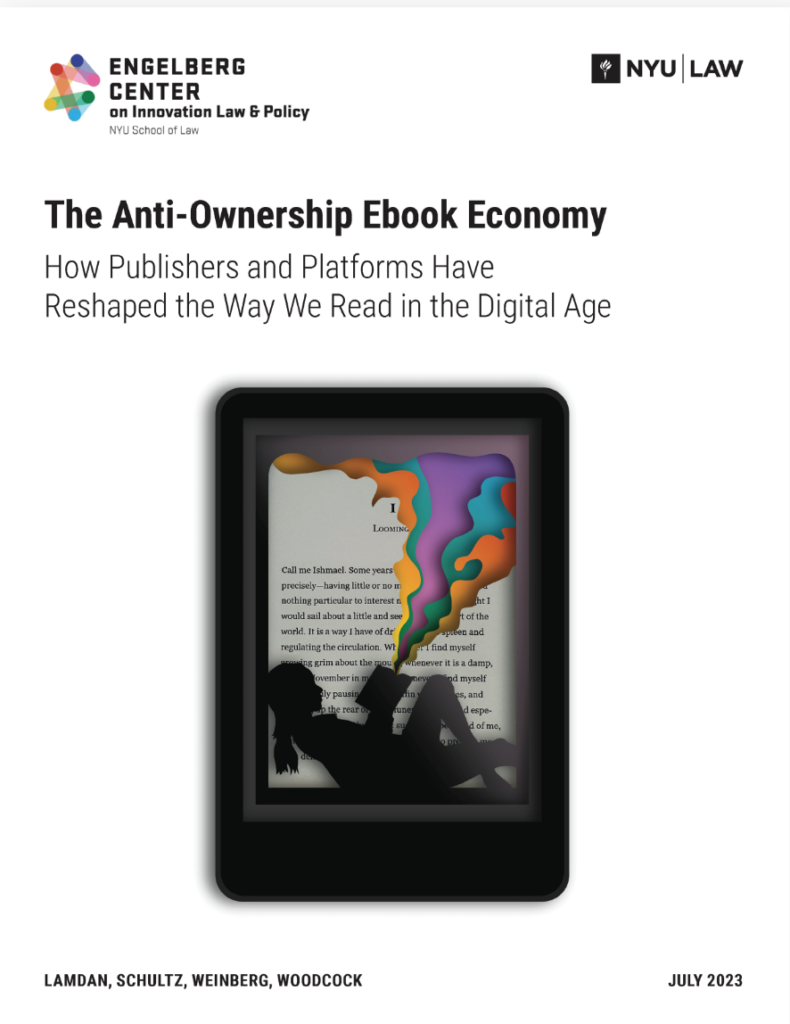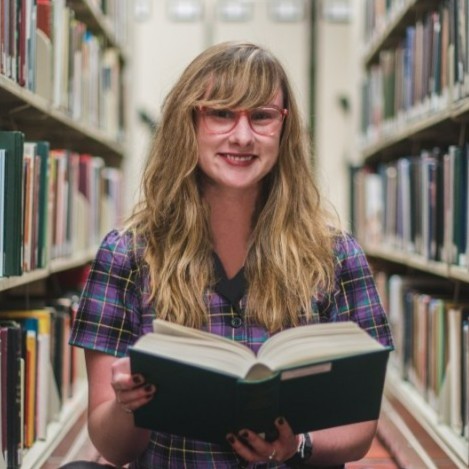
Earlier this month, the Engelberg Center on Innovation Law and Policy at NYU Law released a groundbreaking new report: The Anti-Ownership Ebook Economy: How Publishers and Platforms Have Reshaped the Way We Read in the Digital Age is a detailed report that traces the history of ebooks and, through a series of interviews with publishers, platforms, librarians, and others, explains how the law and the markets have converged to produce the dysfunction we see today in the ebook marketplace.
The report focuses especially closely on the role of platform companies, such as Amazon, Apple and OverDrive, which now play an enormous role in controlling how readers interact with ebooks. “Just as platforms control our tweets, our updates, and the images that we upload, platforms can also control the books we buy, keeping tabs on how, when, and where we use them, and at times, modifying or even deleting their content at will.”

Last Friday, I spoke with one of the authors, Claire Woodcock, to learn a little bit more about the project and its goals:
Q: What was your motivation to work on this project?
A: My co-authors, Michael Weinberg, Jason Schultz, and Sarah Lamdan had all been working on this for well over a year [before] I joined. I knew Sarah from another story I’d written about an ebook platform that was prioritizing the platforming of disinformation last year, and she had approached me about this project. When I hopped on a call with the three of them, I believe it was Michael who posed the core question of this project: “Why can we not own, but only license ebooks?”
I’ve thought about that question ever since. So my role in joining the project was to help talk to as many people as we could – publishers, librarians, platforms, and other stakeholders to try to understand why not. It seems like a simple question but there are so many convoluted reasons and we wanted to try to distill this down.
Q: Many different people were interviewed for this project. Tell me about how that went.
A: There was actually some hesitation to talk; I think a reason why was almost extreme fear of retaliation. So, it took a while to crack into learning about some of the different areas, especially with some publishers and platforms. I wish there was more of a willingness to engage on the part of some publishers, who would flat out tell me things like they weren’t authorized to talk about their company’s internal practices , or from platforms like OverDrive, who we sent our list of questions over to and never heard from again (until I ran into Steve Potash at the American Library Association’s Annual Conference). I’d have loved to hear more from them directly when I was actively conducting interviews.
Q: I noticed there weren’t many interviews with authors. Can you say why not?
A: Authors weren’t as big of a focus because we realized, particularly in talking with several literary agents, that from a business and legal perspective authors don’t have much of a say in how their books are distributed. Contractually, they aren’t involved in downstream use. I think it would be really interesting to do a follow up with authors to get their perspective on how their books are licensed or sold online.
Q: The report contains a number of conclusions and recommendations. Which among them are your favorite?
A: One of the most striking things I learned, and what stuck out to me the most when I went back and listened to the interviews, is the importance of market consolidation and lack of competition. OverDrive has roughly 95% of the ebook marketplace for libraries (and I know it’s different for academic publishing, for sure). The lack of competition in our society, especially in this area, makes it hard to speak up and speak out when a certain stakeholder has issues with the dominant market players. Because of that, looking at each of the groups of stakeholder types we spoke with, each could point to other groups causing the problem (it reminds me of the spiderman meme) and there are platforms and other publishers, mostly smaller, who want to make this work but the major players are not doing that. It also stuck out that, almost everyone we talked to talks about librarians as partners, but when we talk to the librarians, they say “they think we are partners, but we don’t feel like we have a seat at the table, decisions that impact us are often made without consulting us in a way that is transparent.”
Q: If you could do a follow up study, what additional big questions would you focus on?
A: Lots of people talked about audiobooks. We were focused on ebooks, but the audiobook market is even more concentrated, and lots of people raised the issue that ebooks are only part of the issue. There is a version of this that is happening with audiobooks as well. I also think that the intersections of this market with television, platform streaming, and even other consumer goods like toys and other parts of the market are really interesting. What we’re seeing here, it’s a version of what’s happening in other creative industries.
I also think it would be worth learning more about how libraries and others are working around the current issues. For example, lots of libraries ask for perpetual licenses, since they’re looking at working within the current context and looking at contracts so they can get assurances, for example if something happens to the publishers platform, the library could still get some assurances that even if something happened to the company, the license agreement could still be honored. But are those efforts actually effective? And, given the importance of licensing, it might also be interesting to explore how libraries are resourced to negotiate those agreements – for example, training and staff to negotiate. I think if libraries were better funded they would probably be able to better handle these challenges.
Discover more from Authors Alliance
Subscribe to get the latest posts sent to your email.
